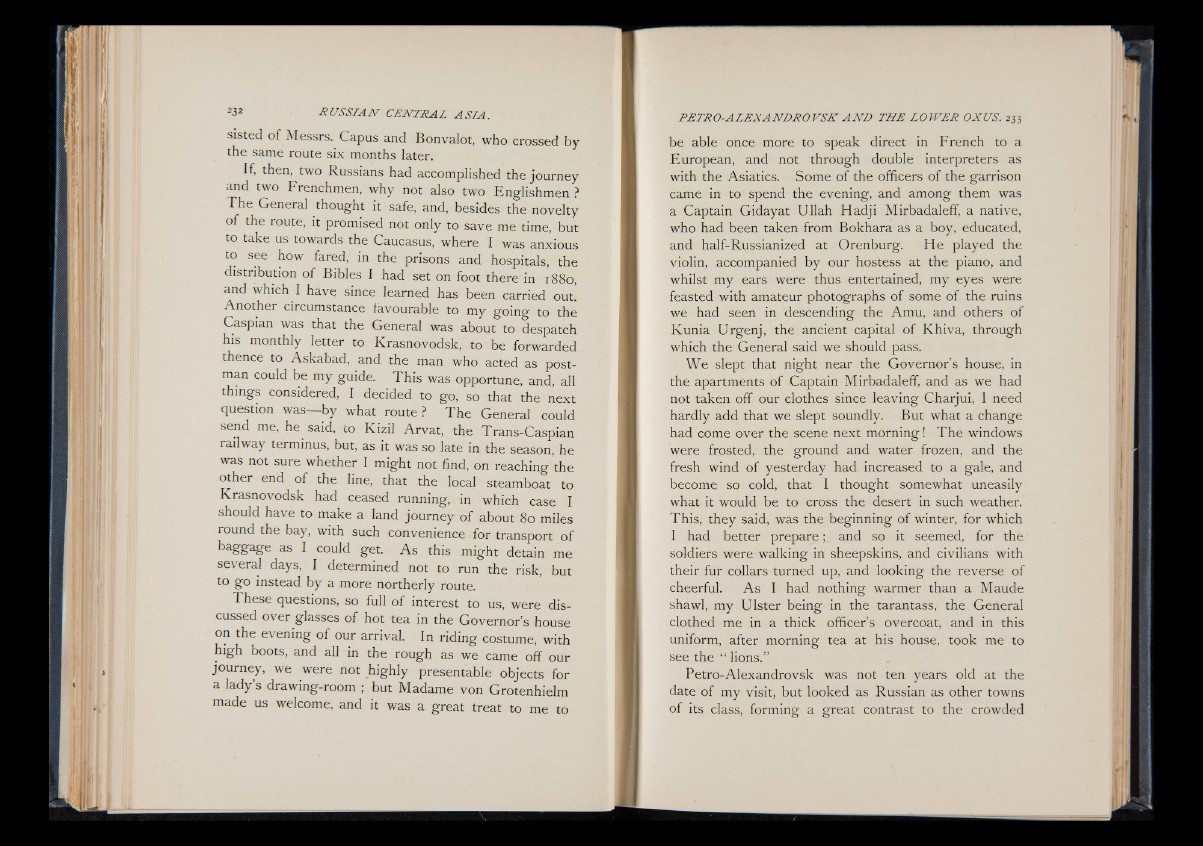
sisted of Messrs. Capus and Bonvalot, who crossed by
the same route six months later.
If, then, two Russians had accomplished the journey
and two Frenchmen, why not also two Englishmen ?
The General thought it safe, and, besides the novelty
of the route, it promised not only to save me time, but
to take us towards the Caucasus, where I was anxious
to see how fared, in the prisons and hospitals, the
distribution of Bibles I had set on foot there in 1880,
and which I have since learned has been carried out.
Another circumstance favourable to my going to the
Caspian was that the General was about to despatch
his monthly letter to Krasnovodsk, to be forwarded
thence to Askabad, and the man who acted as postman
could be my guide. This was opportune, and, all
things considered, I decided to go, so that the next
question was— by what route? The General could
send me, he said, to Kizil Arvat, the Trans-Caspian
railway terminus, but, as it was so late in the season, he
was not sure whether I might not find, on reaching the
other end of the line, that the local steamboat to
Krasnovodsk had ceased running, in which case I
should have to make a land journey o f about 80 miles
round the bay, with such convenience for transport of
b ^ g a g e as I could get. A s this might detain me
several days, I determined not to run the risk, but
to go instead by a more northerly route.
These questions, so full o f interest to us, were discussed
over glasses of hot tea in the Governor’s house
on the evening o f our arrival. In riding costume, with
high boots, and all in the rough as we came off our
journey, we were not highly presentable objects for
a lady’s drawing-room ; but Madame von Grotenhielm
made us welcome, and it was a great treat to me to
be able once more to speak direct in French to a
European, and not through double interpreters as
with the Asiatics. Some of the officers of the garrison
came in to spend the evening, and among them was
a Captain Gidayat Ullah Hadji Mirbadaleff, a native,
who had been taken from Bokhara as a boy, educated,
and half-Russianized at Orenburg. He played the
violin, accompanied by our hostess at the piano, and
whilst my ears were thus entertained, my eyes were
feasted with amateur photographs of some of the ruins
we had seen in descending the Amu, and others of
Kunia Urgenj, the ancient capital of Khiva, through
which the General said we should pass.
We slept that night near the Governor’s house, in
the apartments of Captain Mirbadaleff, and as we had
not taken off our clothes since leaving Charjui, I need
hardly add that we slept soundly. But what a change
had come over the scene next morning! The windows
were frosted, the ground and water frozen, and the
fresh wind of yesterday had increased to a gale, and
become so cold, that I thought somewhat uneasily
what it would be to cross the desert in such weather.
This, they said, was the beginning of winter, for which
I had better p r e p a r e a n d so it seemed, for the
soldiers were walking in sheepskins, and civilians with
their fur collars turned up, and looking the reverse of
cheerful. A s I had nothing warmer than a Maude
shawl, my Ulster being in the tarantass, the General
clothed me in a thick officer’s overcoat, and in this
uniform, after morning tea at his house, took me to
see the “ lions.”
Petro-Alexandrovsk was not ten years old at the
date of my visit, but looked as Russian as other towns
of its class, forming a great contrast to the crowded